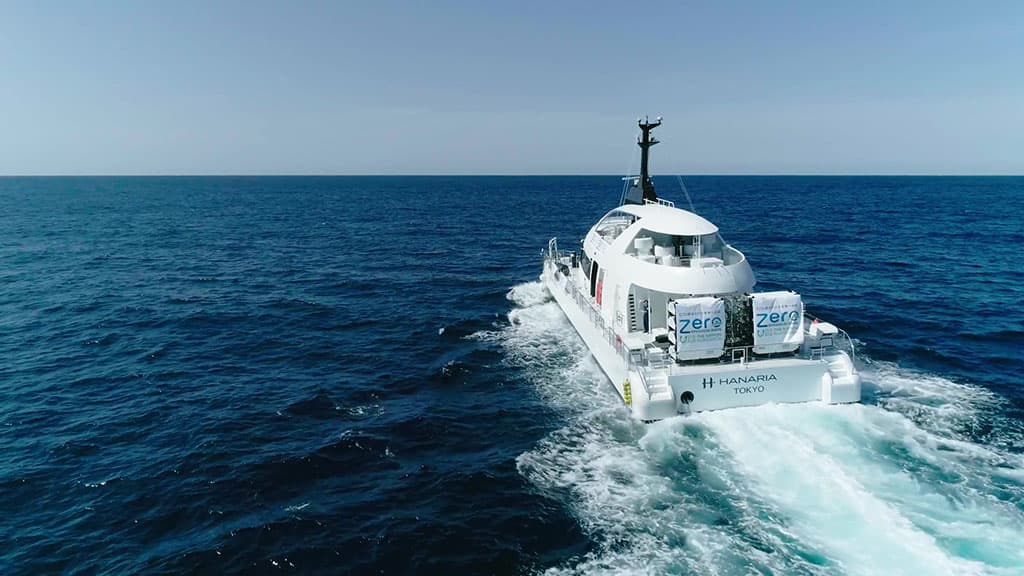- The Nippon Foundation's "Zero Emission Ship Project" successfully demonstrated the world's first zero-emission operation using a hydrogen fuel cell-powered offshore wind turbine work vessel, HANARIA.
- The project aims to reduce CO2 emissions from domestic shipping to zero by 2050, contributing to the realization of a carbon-neutral society.
- Zero-emission ships, utilizing Japan's advanced technologies in hydrogen and engine technologies, are seen as the next-generation vessels that strongly promote the global issue of carbon neutrality.
In a groundbreaking development, the Nippon Foundation has achieved a significant milestone in its "Zero Emission Ship Project" by successfully demonstrating the world's first zero-emission operation using a hydrogen fuel cell-powered offshore wind turbine work vessel, HANARIA. The demonstration, which took place at the Kokura Port in Kitakyushu City from March 26 to April 4, 2024, showcased the vessel's ability to navigate without emitting any CO2. According to a survey conducted by the Nippon Foundation as of March 2024, this is the first time a hydrogen fuel cell-powered offshore wind turbine work vessel has achieved zero-emission operation. Additionally, HANARIA is the first hydrogen fuel cell ship in Japan with a gross tonnage of 20 tons or more.
The Nippon Foundation's ambitious goal is to reduce CO2 emissions from domestic shipping, which currently accounts for 5% of Japan's transportation sector's CO2 emissions, to zero by 2050. By fostering a growing momentum for the development of zero-emission ship technology in Japan and implementing measures to preserve the ocean for future generations, the Foundation is taking significant strides towards the realization of a carbon-neutral society.
Zero-emission ships, which do not emit CO2, are the next-generation vessels that not only strongly promote the realization of a carbon-neutral society, a pressing global issue, but also showcase Japan's world-class advanced technologies in hydrogen and engine technologies. The Nippon Foundation's "Zero Emission Ship Project" has been at the forefront of developing ships equipped with hydrogen fuel (zero-emission ships) since January 2022, ahead of the global curve. Among the three consortia involved in the project, HANARIA is the first to conduct a successful demonstration experiment.
The "Hydrogen Fuel Cell Offshore Wind Turbine Work Vessel Consortium" carried out the demonstration experiment by installing a hydrogen fuel system on the passenger ship "HANARIA" (33m long, 248 gross tons), which can be used for transporting personnel to offshore wind power generation facilities and for on-site inspections and tours by related parties. The vessel completed a round trip of about 30 km between the Kokura Port and the offshore wind power generation facility off Shiraishima, demonstrating zero-emission navigation throughout the entire journey from departure to arrival, powered solely by hydrogen fuel.
In July 2023, the International Maritime Organization (IMO) set a target of "zero emissions from international shipping by around 2050." Japan has also taken a proactive stance, with former Prime Minister Yoshihide Suga announcing in his policy speech in October 2020 that the government aims to reduce greenhouse gas emissions to net zero by 2050 as a pillar of its growth strategy.
As the maritime sector grapples with the need to reduce CO2 emissions from domestic ships to zero by 2050, the shift to carbon-free next-generation fuels and the introduction of next-generation fuel ships have emerged as crucial methods. The Nippon Foundation's "Zero Emission Ship Project" is at the vanguard of this movement, positioning zero-emission ships as a key component of the "Green Growth Strategy for Carbon Neutrality by 2050."
Looking ahead, the Nippon Foundation has plans to develop and demonstrate a zero-emission ship equipped with a hydrogen-dedicated combustion engine by FY2026, further solidifying its commitment to sustainable maritime transportation.
Source:
The Nippon Foundation. (2024, April 4). 世界初※ゼロエミッション運航実証に成功. [Press release]


